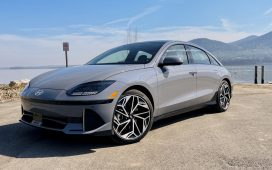
Looking for an electric vehicle that qualifies for the $7,500 tax credit? I hope you’re up on your IRS code.
The electric vehicle tax credit, also known as the “clean vehicle tax credit,” or 30D, if you like IRS code, can offer up to $7,500 off the purchase of a new EV. Sounds nice, right?
But of course, it’s not that easy. This is the IRS we’re talking about after all.
Before you can collect your $7,500 credit from the government, there are a few rules that must be satisfied — rules about where the vehicle is made, where the battery is made, where the minerals are processed, the price of the vehicle, your own annual income, and much, much more.
If you thought it would be as easy as walking into a dealership, picking out the EV of your choosing, and collecting your credit, you were sorely mistaken.
The EV tax credit is more than just an incentive to get Americans to ditch their dirty gas-powered cars and replace them with clean, quiet zero-emission vehicles. It’s also an energy security measure aimed squarely at busting up China’s influence over the EV battery industry.
Will it succeed? Automakers are falling over themselves to set up manufacturing operations in North America in order to comply with the rules. And car buyers are making decisions based on which cars are eligible.
In addition to the stories listed below, here are a few resources to help you figure out if the car you want qualifies for the $7,500 credit:
- The rules for cars purchased in 2022 or before.
- The rules for cars purchased after January 1st, 2023.
- The list of eligible vehicles.
- The rules for used cars.
- The rules for commercial vehicles.
The list of eligible vehicles is very fluid. Cars are being added, removed, and being re-added. It will likely remain this way for a while as the auto industry acclimates to the rules and customers continue to lean toward those vehicles that qualify.
But one thing is for sure: the tax credit will continue to loom large over the industry’s shift to electric. Just be sure to talk to an accountant before you try to claim it.












